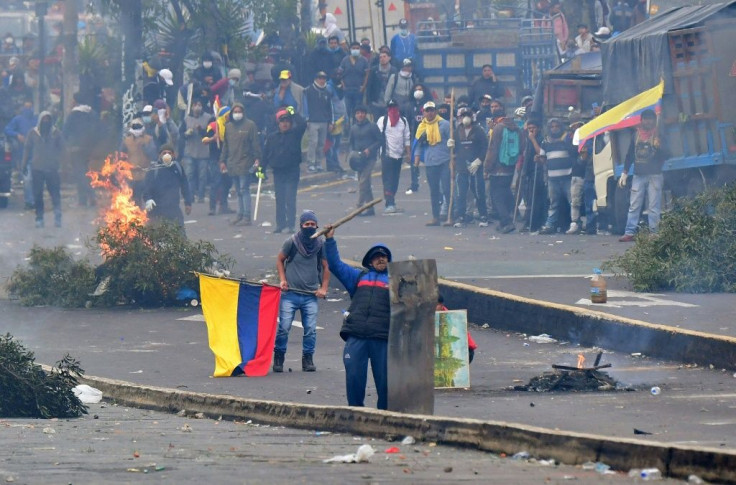Ecuador: Oil-rich Country In Crisis

Catholic-majority Ecuador, oil-rich but saddled with debt, is embarking on reforms that have led to fuel price hikes and sparked the biggest protests in a decade.
Here is some background about the country of 17 million people.
Instability
Once part of the Inca Empire, Ecuador was ruled by Spain until 1822 when it became part of Gran Colombia led by South American independence hero Simon Bolivar.
An independent republic in 1830, Ecuador was under military rule from 1972 to 1979 when it returned to democracy.
The country endured a period of instability between 1997 and 2005 during which three presidents were ousted after massive protests.
Socialists in power
The 2006 election of left-wing former economist Rafael Correa brought a decade of calm. He was re-elected in 2009, after the adoption of a constitution renforcing state control of the economy, and again in 2013.
In 2012 he granted asylum to WikiLeaks founder Julian Assange at Ecuador's embassy in London.
Correa was succeed in 2017 by his deputy Lenin Moreno, who is wheelchair-bound after being shot during a robbery in 1998.
He and Correa clashed in 2018 when Moreno held a referendum that backed the imposing of presidential term limits, thus preventing Correa's return.
Wanted in his homeland on suspicion of kidnapping, Correa has lived in exile in Belgium since 2017.
In July 2019 Moreno withdrew the asylum granted to Assange.
Dwindling oil revenue
Ecuador is the world's largest banana exporter and a major producer of coffee and cocoa.
It also holds four billion barrels of oil reserves and in August 2019 produced more than 500,000 barrels per day.
On October 1 it announced it would leave the Organization of Petroleum Exporting Countries (OPEC) at the start of 2020 due to financial difficulties.
It already left 1992 -- saying the group's refusal to raise the its production quota was economically damaging -- but returned in 2007.
The exploitation of crude oil has boosted Ecuador's growth, reducing poverty and inequality.
But the drop in crude prices, the rise of the dollar -- Ecuador's economy has been dollarized since 2000 -- and the devaluation of currencies in neighbouring countries has caused revenues to plummet.
In March heavily indebted Ecuador concluded an agreement with the International Monetary Fund to borrow $4.2 billion in exchange for economic reforms over a three-year period.
As part of the deal, the government announced the end of fuel subsidies, raising prices by up to 123 percent -- a catalyst for widespread protests that led Moreno to declare a state of emergency on October 3.
Volcanoes, forest
The Pacific Ocean country includes the marine-rich Galapagos archipelago, listed as a world heritage site by UNESCO.
It is in a zone of high seismic activity, with about 100 volcanoes in an "avenue" along the Andes mountain chain.
In 2016 a 7.8-magnitude earthquake killed 673 people. The capital Quito, with a population of 2.2 million, is wrapped around the slopes of the Pichincha volcano.
The Amazon forest covers part of Ecuador and is the habitat of indigenous people including the Waorani Indians, who are threatened by the exploitation of oil resources.
© Copyright AFP 2024. All rights reserved.











